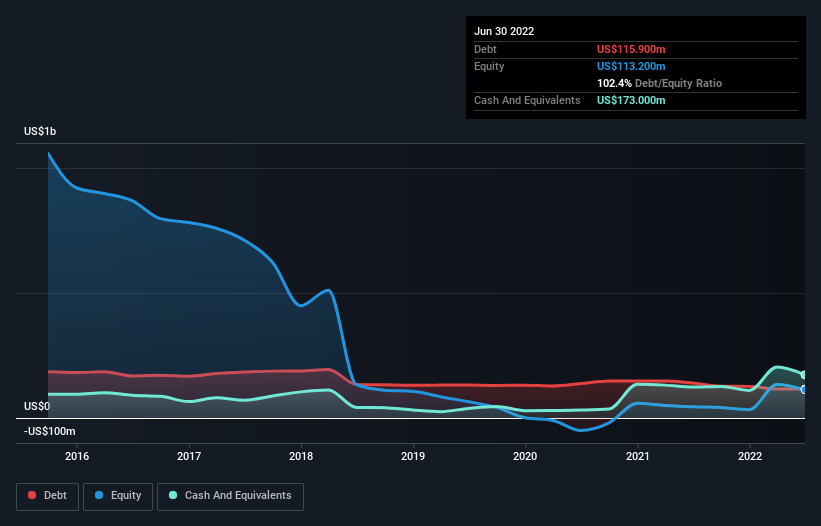Warren Buffett famously said, 'Volatility is far from synonymous with risk.' So it might be obvious that you need to consider debt, when you think about how risky any given stock is, because too much debt can sink a company. We can see that REC Silicon ASA (OB:RECSI) does use debt in its business. But should shareholders be worried about its use of debt?
When Is Debt Dangerous?
Generally speaking, debt only becomes a real problem when a company can't easily pay it off, either by raising capital or with its own cash flow. Part and parcel of capitalism is the process of 'creative destruction' where failed businesses are mercilessly liquidated by their bankers. However, a more frequent (but still costly) occurrence is where a company must issue shares at bargain-basement prices, permanently diluting shareholders, just to shore up its balance sheet. Of course, debt can be an important tool in businesses, particularly capital heavy businesses. When we think about a company's use of debt, we first look at cash and debt together.
See our latest analysis for REC Silicon
How Much Debt Does REC Silicon Carry?
As you can see below, REC Silicon had US$115.9m of debt at June 2022, down from US$139.7m a year prior. However, it does have US$173.0m in cash offsetting this, leading to net cash of US$57.1m.

How Strong Is REC Silicon's Balance Sheet?
Zooming in on the latest balance sheet data, we can see that REC Silicon had liabilities of US$147.8m due within 12 months and liabilities of US$107.0m due beyond that. Offsetting this, it had US$173.0m in cash and US$26.6m in receivables that were due within 12 months. So it has liabilities totalling US$55.2m more than its cash and near-term receivables, combined.
Of course, REC Silicon has a market capitalization of US$822.4m, so these liabilities are probably manageable. However, we do think it is worth keeping an eye on its balance sheet strength, as it may change over time. Despite its noteworthy liabilities, REC Silicon boasts net cash, so it's fair to say it does not have a heavy debt load! When analysing debt levels, the balance sheet is the obvious place to start. But it is future earnings, more than anything, that will determine REC Silicon's ability to maintain a healthy balance sheet going forward. So if you're focused on the future you can check out this free report showing analyst profit forecasts.
Over 12 months, REC Silicon reported revenue of US$159m, which is a gain of 22%, although it did not report any earnings before interest and tax. With any luck the company will be able to grow its way to profitability.
So How Risky Is REC Silicon?
We have no doubt that loss making companies are, in general, riskier than profitable ones. And we do note that REC Silicon had an earnings before interest and tax (EBIT) loss, over the last year. And over the same period it saw negative free cash outflow of US$51m and booked a US$62m accounting loss. But the saving grace is the US$57.1m on the balance sheet. That means it could keep spending at its current rate for more than two years. With very solid revenue growth in the last year, REC Silicon may be on a path to profitability. By investing before those profits, shareholders take on more risk in the hope of bigger rewards. The balance sheet is clearly the area to focus on when you are analysing debt. But ultimately, every company can contain risks that exist outside of the balance sheet. Case in point: We've spotted 2 warning signs for REC Silicon you should be aware of.
Of course, if you're the type of investor who prefers buying stocks without the burden of debt, then don't hesitate to discover our exclusive list of net cash growth stocks, today.
New: AI Stock Screener & Alerts
Our new AI Stock Screener scans the market every day to uncover opportunities.
• Dividend Powerhouses (3%+ Yield)
• Undervalued Small Caps with Insider Buying
• High growth Tech and AI Companies
Or build your own from over 50 metrics.
Have feedback on this article? Concerned about the content? Get in touch with us directly. Alternatively, email editorial-team (at) simplywallst.com.
This article by Simply Wall St is general in nature. We provide commentary based on historical data and analyst forecasts only using an unbiased methodology and our articles are not intended to be financial advice. It does not constitute a recommendation to buy or sell any stock, and does not take account of your objectives, or your financial situation. We aim to bring you long-term focused analysis driven by fundamental data. Note that our analysis may not factor in the latest price-sensitive company announcements or qualitative material. Simply Wall St has no position in any stocks mentioned.
About OB:RECSI
REC Silicon
Produces and sells silicon materials for the solar and electronics industries in Norway and internationally.
Moderate risk and fair value.
Similar Companies
Market Insights
Community Narratives



